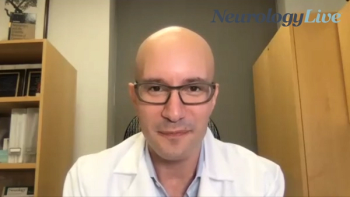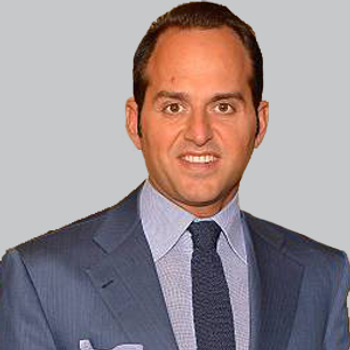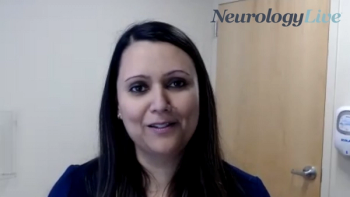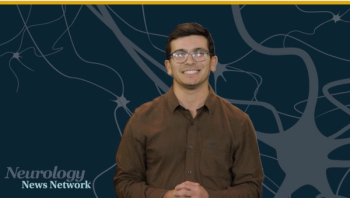
The primary outcome of the study, 50% reduction in corticosteroid dosing, was achieved by 60% of patients on IGIV-C and 63.3% of those randomly assigned to placebo.

The primary outcome of the study, 50% reduction in corticosteroid dosing, was achieved by 60% of patients on IGIV-C and 63.3% of those randomly assigned to placebo.

Over a 24-month treatment period, apitegromab-treated patients showed improvements on PEDI-CAT and PROMIS, measures of activities of daily living, and ESBBT, a muscle endurance measurement tool.

The neurologist at the Corinne Goldsmith Dickinson Center for MS offered a brief overview of his experience at the 2022 IFN conference held in New York City on September 23-24. [WATCH TIME: 4 minutes]

Permanent disability, found in 51% of patients with NMOSD at follow-up, was attributed mainly to age of disease onset, delay in diagnosis, and initial EDSS score.

The adult neurologist at Allegheny Health Network provided insight on the steps taken to ensure a patient with myasthenia gravis is on an effective and safe therapy. [WATCH TIME: 7 minutes]

Foralumab, an anti-CD3 monoclonal antibody, has been previously assessed in diseases such as progressive multiple sclerosis and Crohn disease, as well as in patients with mild to moderate COVID-19.

Fan Nils Yang, PhD, postdoctoral researcher, University of Maryland, provides greater detail on the observational cohort study he did with colleagues, where they identified a link between neurocognitive function in children and insomnia.

The director of the MedStar Georgetown University Hospital Headache Center tells her experience in a medical crossfire as the migraine cochair at the fourth annual International Congress on the Future of Neurology. [WATCH TIME: 5 minutes]

The adult neurologist at Allegheny Health Network provided insight on the current state of care for myasthenia gravis and strides the community has made in recent decades. [WATCH TIME: 7 minutes]

Within 5 years after the index date, the lowest proportion of epilepsy diagnoses were among those treated with angiotensin receptor blockers and highest in those on ß-blockers and calcium channel blockers.

Changes in plasma pTau217 and GFAP levels from donanemab significantly correlated with percent change in amyloid plaque level as measured by amyloid PET imaging.

The director of the MedStar Georgetown University Hospital Headache Center shares her experience as the migraine cochair at the fourth annual International Congress on the Future of Neurology. [WATCH TIME: 5 minutes]

Test your neurology knowledge with NeurologyLive®'s weekly quiz series, featuring questions on a variety of clinical and historical neurology topics. This week's topic is the history of the European Committee for Treatment and Research in Multiple Sclerosis.

The composite score, which consisted of 6 linguistic features and 3 acoustic features, was shown to be sensitive to measures of disease progression, with a potential to help understand treatment response.

In a traditional placebo-controlled trial, Nerivio outperformed placebo in the reduction monthly migraine days and monthly headache days, regardless of chronic or episodic migraine status.

Neurology News Network for the week ending October 22, 2022. [WATCH TIME: 4 minutes]

Take 5 minutes to catch up on NeurologyLive®'s highlights from the week ending October 21, 2022.

The director of the Center for Brain Health and Alzheimer prevention clinic at FAU medicine shares his experience during the Medical Crossfire session on the Alheimer pipeline that he took part in at the fourth annual International Congress on the Future of Neurology. [WATCH TIME: 7 minutes]

For patients who rolled over to the ARC-HD extension study from the previous First-HD trial, there was a 4.5-point reduction in mean chorea scores at week 8 that were maintained through week 145.

The neurologist at Allegheny Health Network’s Neuroscience Institute provided insight on the mechanism of action of fenebrutinib and how it differs from other BTK inhibitors currently in development. [WATCH TIME: 3 minutes]

Mind Moments®, a podcast from NeurologyLive®, brings you exclusive interviews with Stephen Krieger, MD; Richard Isaacson, MD; and Jessica Ailani, MD. [LISTEN TIME: 24 minutes]

Based on a trial that showed melatonin improved total sleep time in children with ADHD and sleep onset insomnia, Colonis’ Melatonin 1mg/ml Oral Solution was approved by the MHRA in the United Kingdom.

The director of the Center for Brain Health and Alzheimer prevention clinic at FAU medicine provides commentary about his time at the fourth annual International Congress on the Future of Neurology. [WATCH TIME: 4 minutes]

When asked which efficacious diagnostic or treatment options they hope to see in the future, a majority of physicians, especially specialists, expressed a desire to see more useful biomarkers, followed by more effective diagnostic tests overall.

Although neurodevelopmental disorders were common in those on antidepressants, the crude hazard ratios were substantially attenuated after adjustment for measured covariates and proxies for unmeasured covariates.

In a propensity score matched, longitudinal, observational cohort study, findings showed that there was an association between insomnia and neurocognitive function in children.

After a successful phase 1 study in which PTC518 reduced huntingtin protein by 30% to 50%, the company is pausing the US enrollment of its phase 2 study until additional data is provided to the FDA.

Sharon Hesterlee, PhD, chief research officer, Muscular Dystrophy Association, discussed the events that happened in September for National Muscular Dystrophy Awareness Month.

More than 40% of patients with ASPECTS scores between 4 and 5 treated with EVT showed functional outcome improvements, whereas slightly over 20% of those with scores between 0 to 3 demonstrated the same.